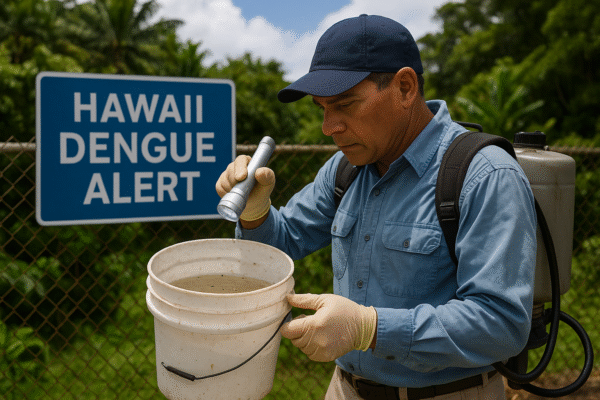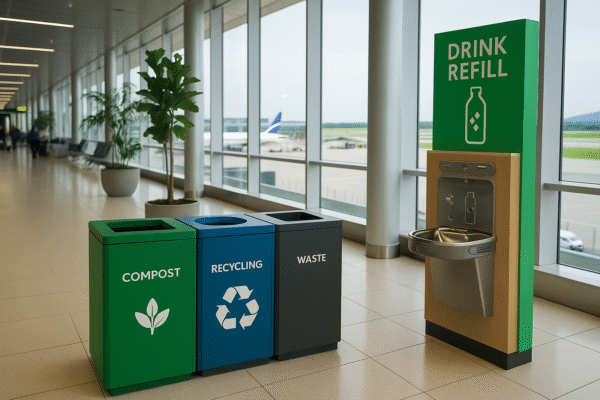Airports across the globe are redefining what it means to be travel hubs by leading the charge in environmental sustainability. From banning single-use plastics to turning food waste into compost, these once resource-heavy facilities are becoming symbols of green innovation. With millions of passengers passing through each year, these eco-friendly practices are not just beneficial—they’re essential to reducing aviation’s environmental footprint.
Composting and Food Recovery: Turning Waste into Resources
Food waste has long been a significant challenge for airports, which serve millions of meals annually. Now, forward-thinking hubs are turning this problem into an opportunity.
At San Francisco International Airport (SFO), the “SFO Unites Against Hunger” program allows airport vendors to donate surplus or near-expiry food to local charities, reducing landfill waste while supporting food-insecure communities. This dual-purpose approach not only cuts waste but also strengthens the airport’s community impact.
Meanwhile, Portland International Airport (PDX) has been composting food scraps since 2003. In 2013, PDX partnered with local nonprofit Urban Gleaners to channel excess food from restaurants and shops directly to families in need. This partnership has diverted tons of edible food from landfills while ensuring Oregonians in need have access to nutritious meals.
Banning Single-Use Plastics: Leading the Way in Waste Reduction
Plastic pollution has become one of the most urgent environmental crises, and airports are stepping up. San Francisco International Airport was one of the first in the U.S. to ban single-use plastic bottles in 2022, replacing them with glass or aluminum options. Passengers can now refill their bottles at stations offering chilled, ambient, or hot water—eliminating the need for disposable containers entirely.
Food vendors at SFO have also transitioned to fiber-based plates and compostable cutlery, further reducing the airport’s plastic footprint. This shift is not only an environmental win but also a step toward influencing passenger behavior toward more sustainable choices.
The Green Plate Program: Reusable Dishware for a Zero-Waste Future
Portland International Airport has pioneered the Green Plate Program, providing restaurants with durable, reusable dishware that is centrally washed and sanitized. Initially rolled out in Concourse C, the program is expanding airport-wide. By replacing disposable tableware with reusable options, PDX significantly reduces landfill waste and operational costs associated with single-use products.
Recycling Cigarette Butts: An Innovative Approach to Litter
Cigarette butts are among the most common forms of litter in public spaces, including airports. To address this, airports are partnering with TerraCycle, a company that recycles cigarette filters—made of cellulose acetate—into products like park benches, pallets, and tool handles. This unique program prevents harmful microplastics from entering waterways while promoting a circular economy.
Government Support and Policy Frameworks
The U.S. Federal Aviation Administration (FAA) plays a key role in encouraging sustainable airport operations. Under the FAA Modernization and Reform Act of 2012, federally funded airports must create waste reduction and recycling plans. The FAA provides technical guidance to help airports strengthen these programs, making sustainability an operational priority rather than an optional initiative.
Global Leadership in Sustainable Airport Practices
Airports outside the U.S. are also setting impressive sustainability benchmarks. In Hong Kong, the government has implemented a large-scale food waste recycling system, converting organic waste into compost and biogas. The establishment of Organic Waste Treatment Facilities (OWTFs) has reduced landfill pressure and curbed greenhouse gas emissions.
South Korea offers another success story, with mandatory food waste separation laws that charge citizens based on the waste they generate. Collected food waste is transformed into animal feed or compost, dramatically reducing environmental impact and promoting a resource-recovery model.
Why Sustainability Matters for Airports and Passengers
The aviation industry is responsible for about 2–3% of global CO₂ emissions, and while airlines focus on fuel efficiency, airports have their own environmental responsibilities. Waste reduction through composting, recycling, and bans on single-use plastics not only cuts greenhouse gas emissions but also enhances the passenger experience.
Eco-conscious travelers increasingly choose airports and airlines that align with their values. According to the Airports Council International (ACI), over 70% of passengers say they support green initiatives and prefer facilities with visible sustainability measures.
The Future of Green Airports
Sustainable airport operations are no longer a niche concept—they are becoming the global standard. As passenger numbers continue to rise, airports must scale these programs to keep pace with demand while meeting environmental targets.
Collaboration will be key. Airport authorities, airlines, vendors, and passengers must work together to ensure waste reduction goals are met. In the future, we can expect more airports to invest in:
- On-site renewable energy systems to power terminals
- Advanced waste-to-energy technologies to process organic waste
- Airport-wide zero-waste commitments with measurable targets
Conclusion: Travel and Sustainability Can Fly Together
Airports are no longer just gateways to destinations—they are now gateways to a sustainable future. Through food waste recovery, composting, single-use plastic bans, and innovative recycling initiatives, airports are redefining eco-friendly travel.
With global cooperation, regulatory backing, and passenger support, the day when all airports operate as zero-waste hubs is within reach. For travelers, this means flying not just to a destination, but toward a greener, cleaner planet.
For more travel news like this, keep reading Global Travel Wire















